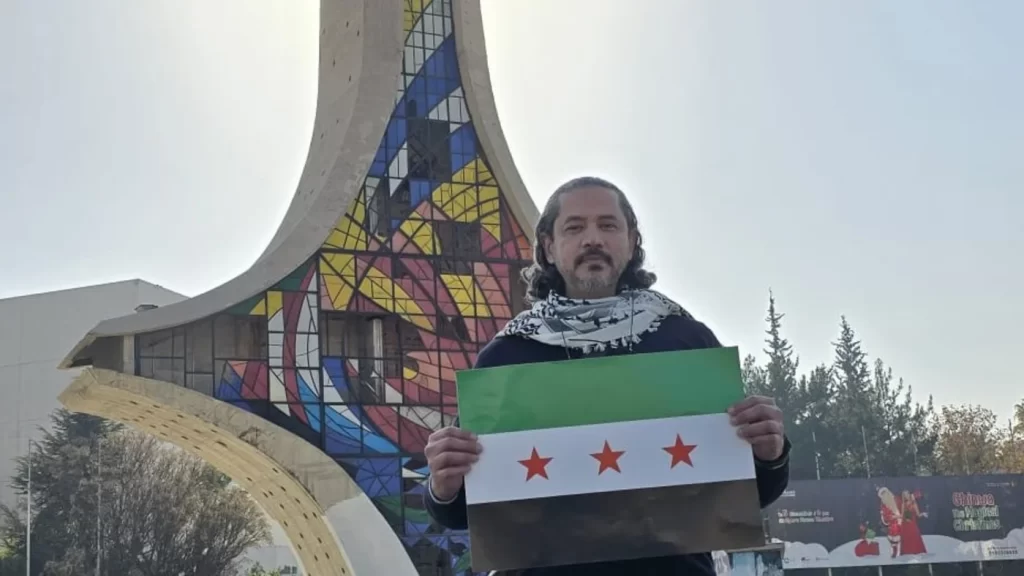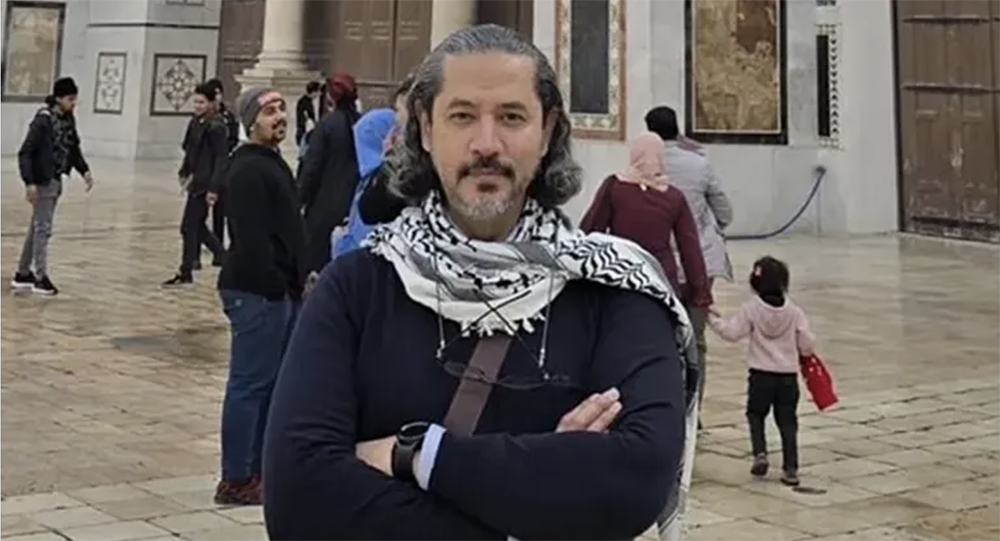To read this snapshot as a PDF, click here.
SUMMARY
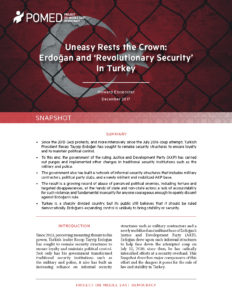 Since the 2013 Gezi protests, and more intensively since the July 2016 coup attempt, Turkish President Recep Tayyip Erdoğan has sought to remake security structures to ensure loyalty and to maintain political control.
Since the 2013 Gezi protests, and more intensively since the July 2016 coup attempt, Turkish President Recep Tayyip Erdoğan has sought to remake security structures to ensure loyalty and to maintain political control.- To this end, the government of the ruling Justice and Development Party (AKP) has carried out purges and implemented other changes in traditional security institutions such as the military and police.
- The government also has built a network of informal security structures that includes military contractors, political party clubs, and a newly militant and mobilized AKP base.
- The result is a growing record of abuse of perceived political enemies, including torture and targeted disappearances, at the hands of state and non-state actors; a lack of accountability for such violence; and fundamental insecurity for anyone courageous enough to openly dissent against Erdoğan’s rule.
- Turkey is a sharply divided country, but its public still believes that it should be ruled democratically. Erdoğan’s expanding control is unlikely to bring stability or security.
INTRODUCTION
Since 2013, perceiving mounting threats to his power, Turkish leader Recep Tayyip Erdoğan has sought to remake security structures to ensure loyalty and maintain political control. Not only has his government transformed traditional security institutions such as the military and police, it also has built an increasing reliance on informal security structures such as military contractors and a newly mobilized and militant base of Erdoğan’s Justice and Development Party (AKP). Erdoğan drew upon such informal structures to help face down the attempted coup on July 15, 2016; since then, he has radically intensified efforts at a security overhaul. This Snapshot describes major components of this effort and the dangers it poses for the rule of law and stability in Turkey.
ERDOĞAN’S FEAR OF OVERTHROW: A CORE FEATURE OF AKP RULE
Erdoğan’s sense of Turkish history—and a key driver of his political actions—derives from an Islamist narrative that portrays the country’s past century as the story of “a nation denied.” This narrative holds that the Turkish nation is at its core a devout Islamic polity and that a secularist elite, often acting through the military, has sought to constrain or deny its fundamentally Muslim character. It is through this frame that Erdoğan sees pivotal events such as the 1908 Young Turk Revolution against Sultan Abdülhamit II (reigned 1876-1909), whom Erdoğan (incorrectly) believes was executed.[1] His narrative continues through the 1960 coup d’état against the freely elected Prime Minister Adnan Menderes (served from 1950 to 1960), whom the military actually did execute, to President Turgut Őzal (served as Prime Minister from 1983 to 1989 and as President from 1989 to 1993), whose body the Turkish government exhumed in 2012 to investigate the possibility that he had been poisoned to death (no conclusive evidence was found).[2] The narrative then runs through the military’s efforts in the 1990s to keep Necmettin Erbakan, Erdoğan’s predecessor as leader of the religious right, from power. Perhaps its most powerful symbol for Erdoğan was his own imprisonment for four months in 1999. Erdoğan sees in his leadership the final victory of the true national will, and in Turkish history a clear demonstration that this national will can be maintained only with constant vigilance against enemies within the state itself.
Erdoğan’s fear of a military overthrow, therefore, made countering secularists within the security institutions one of his main goals when he came to power in early 2003. Initially he found the followers of Fethullah Gülen, who had begun to infiltrate the military and especially the police in the 1990s, ideal allies in this effort. In many respects, the Gülen movement and the AKP of the early 2000s shared a common vision of Islamic modernism. The Gülen movement was a strong supporter of Turkey’s membership in the European Union and saw itself as a rival to both Salafism and Iran. And like the Milli Gőruş (National Vision) movement from which most of the AKP leadership sprang, Gülenists had been frequent targets of the military in its campaign against Islamism.[3] Thus, during the first decade of AKP rule, Erdoğan accepted and indeed encouraged the Gulenists’ expansion inside Turkey’s security institutions.
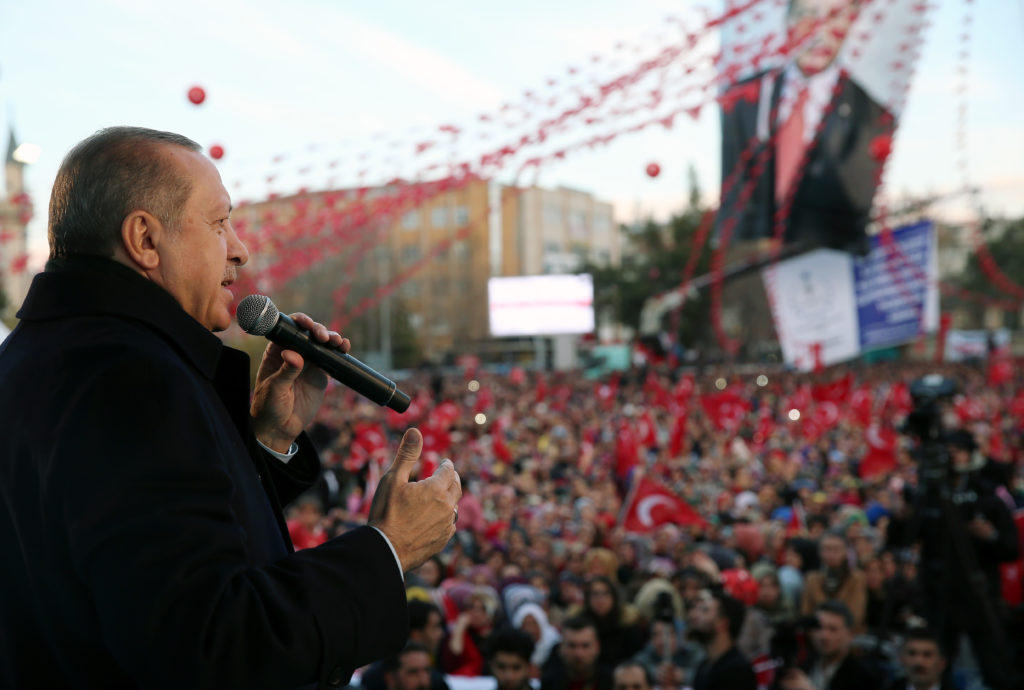 President Erdoğan addresses the AKP’s Karaman Provincial Congress on December 17, 2017. Photo: AK Party
President Erdoğan addresses the AKP’s Karaman Provincial Congress on December 17, 2017. Photo: AK Party
The alliance between Erdoğan and the Gülen movement facilitated the entrenchment of Gülen-affiliated police, prosecutors, and judges who soon proved effective in going after shared political enemies. They targeted pro-Kurdish activists and politicians in mass trials between 2009 and 2011. More famously, they launched the Ergenekon trials that began in 2008 and the Sledgehammer trial that began the following year, both of which prosecuted secularists for alleged attempts to overthrow the democratic order. The deeply flawed trials sent thousands to prison, including leading members of the military, based on incomplete or nonexistent evidence. The effect was to sideline many traditional Kemalists in the officer corps and to increase the influence of Erdoğan’s political allies, including Gülen. The trials inaugurated a strategy that would dramatically expand the politicization of key state institutions and set the basic formulae for today’s purges.
In 2013, Erdoğan redoubled efforts to exert control over security institutions in the face of two key challenges. In May of that year, millions of Turks nationwide joined the Gezi Park protests against Erdoğan and the AKP. Erdoğan was convinced that the protestors were part of a plot to oust him from power in a Turkish “color revolution,” and he ordered a massive crackdown. After the protests, Erdoğan militarized the police force, which primarily became tasked with suppressing dissent instead of fighting crime.[4] Empowered by new laws passed after Gezi, Turkish police have become far more effective at dispersing protests and at deploying overwhelming force to suppress peaceful protests and control urban spaces.[5]
Perhaps even more dangerously, starting in the summer of 2013, what had become an increasingly distrustful relationship between Erdoğan and the Gülen movement broke into open conflict.[6] As the crisis escalated, Gülenist prosecutors and police launched an anti-corruption campaign against the AKP that featured leaks apparently demonstrating staggering malfeasance at the highest levels of government.[7] In response, Erdoğan launched a broad purge of the Gülen movement, leading to the Turkish government formally declaring it a terrorist organization in May 2016.[8] Thus the massive purges of state institutions after the attempted coup that July intensified an effort that was already well underway.
THE 2016 COUP ATTEMPT AND ITS AFTERMATH: THE AKP’S JACOBIN PHASE
If Erdoğan saw himself as a revolutionary when he came to power in 2003, by 2016 his self-image was of a popular leader surviving a dangerous counter-revolution that had personally targeted him. Since the coup attempt, which he blames on Gülenists and their allies inside the military, Turkey has entered a new Jacobin phase. Seeing himself as justified in casting aside any limits, whether those based on rule of law at home or condemnation abroad, Erdoğan has tightened AKP control through the indiscriminate use of Emergency Decree Laws that have enabled the purge of more than 160,000 people from the judiciary, universities, and other state institutions. The government has summarily closed hundreds of civil society organizations and has confiscated approximately 1,000 businesses. Erdoğan further consolidated his control through an April 2017 constitutional referendum that established a powerful presidential system that would potentially allow him to govern until 2029, or, according to some accounting, until 2034.[9]
Politicizing Formal Security Institutions
In the wake of a bloody coup attempt, establishing better control over formal security institutions would be a priority for any ruler, but Erdoğan’s crackdown has been dramatic and revolutionary. By August 2017, the government had suspended or dismissed some 26,000 people from security services attached to the Ministry of Interior, including the police, gendarmes, and the Coast Guard, as well as nearly 8,000 people from the military.[10] Metin Gürcan notes that more than 40 percent of the land and air force generals, nearly 60 percent of naval admirals, and “around 30 percent of the staff officers in charge of concept development and planning in strategic headquarters such as the Turkish General Staff and force commands” have been formally discharged since the coup attempt.[11] While purges at lower ranks have not been on the same scale, the dismissals represent a shocking blow to the upper echelons of the Turkish military. New arrests of police and military personnel occur on a weekly basis.
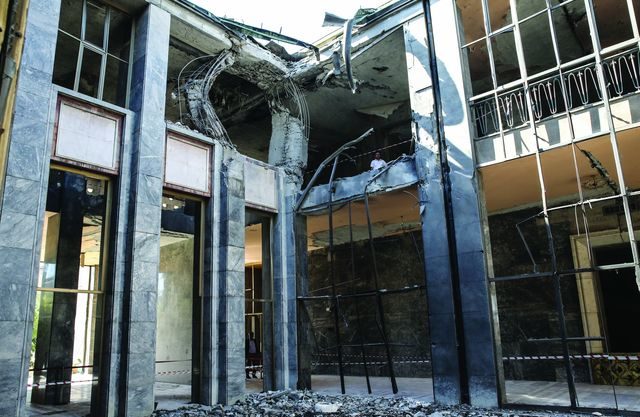 The aftermath of Turkish F-16 attacks on the parliament building during the July 2016 coup attempt. Photo: Ministry of Foreign Affairs
The aftermath of Turkish F-16 attacks on the parliament building during the July 2016 coup attempt. Photo: Ministry of Foreign Affairs
The AKP government has tried to “coup-proof” these institutions by recruiting from its own base and that of current allies, notably the ultranationalist right, to fill the vacated positions.[12] Its efforts may not succeed, however, precisely because the government has had to recruit tens of thousands of new people into the military and police so quickly. The military and police may not become any more politically reliable than in the past, in part because they are less professional, and in part because in replacing the expertise of those purged, the government has been forced to form alliances with former secularist enemies. For example, within months of the July coup attempt, ten colonels convicted in the Ergenekon and Sledgehammer trials were reinstated into the military and promoted to brigadier generals or rear admirals.[13] The government presumably believes that a shared hatred of the Gülenists, a resurgent Turkish nationalism, a more aggressive stance against the Kurds, and the sheer weight of the AKP’s consolidation of power will ensure their loyalty. For now, the alliance seems to be holding, but the underlying fractures could easily rupture in the face of new events.
Erdoğan is clearly worried about another coup attempt or even his assassination. It is likely that his desire to purchase the Russian-made S-400 Air Defense System—a significant source of tension between Turkey and NATO—is based in part on fear of a repeat of the attacks suffered during the 2016 coup attempt, when Turkish Air Force F-16 jets bombed the parliament building and attempted to intercept the presidential plane. Aaron Stein notes that while the S-400 has limited value for defending against likely external threats, it offers potential value “as a stand-alone system…against internal threats. A battery in or near Ankara could be used to defend airspace around key government installations from high-performance aircraft, like the F-16.”[14] In other words, the primary utility of the S-400s appears to be its capacity to defend the government against attacks by elements of the Turkish Air Force.[15]
Contracting Security: Erdoğan and SADAT
In Erdoğan’s scramble for reliable allies against potential threats from within the formal security services, he also has built closer ties with a Turkish military contractor, SADAT. The company describes itself as an “international defense consultancy” offering training for military and security services. SADAT’s website boasts of its support for Turkish defense and defines its mission as “supporting the cooperation in defense and defense industries of the Islamic World [so that they may] take their rightful place among the World’s Super Powers.”[16]
Some observers claim that Turkey has outsourced some of its paramilitary activities in Libya and Syria to SADAT, and opposition politicians have suggested that the company has facilitated Turkey’s outreach to Salafi-jihadi groups, including the Islamic State.[17] Some argue that the firm also is providing protection to Erdoğan’s government inside Turkey.[18] Michael Rubin colorfully describes SADAT “as [Erdoğan’s] personal militia or a Turkish equivalent of the Islamic Revolutionary Guard Corps” and contends that SADAT paramilitaries played key roles in suppressing the 2016 coup attempt.[19]
Although it is difficult to pin down SADAT’s exact activities inside Turkey, there is no doubt about the company’s newfound prominence. Its founder, Adnan Tanrıverdi, a former general with longstanding ties to Turkey’s Islamists, became a senior advisor to Erdoğan in August 2016. SADAT’s militantly Islamist and nationalist ideological profile, along with Tanrıverdi’s dual roles as SADAT owner and presidential advisor, point to a grey zone between the company and state functions. The relationship highlights the increased politicization of Turkey’s military and security services, and could, in a crisis, facilitate extrajudicial targeting of political enemies in the service of the state. There is strong evidence today of enforced disappearances by unknown actors of both Kurds and members of the Gülen movement.[20] SADAT’s ideological profile, paramilitary experience, and close ties to the government make it an ideal ally for the sort of “dirty war” against opposition groups that Turkish security services outsourced to sympathetic non-state actors in the past.[21]
Ocaklar (“Hearths,” or Political Clubs)
Another important emerging source of security support for Erdoğan is newly prominent political clubs, or ocaklar (“hearths”). The “hearth” tradition is longstanding in the Turkish Republic and closely associated with right-wing nationalist political parties. These clubs often serve to build strong party ties at the neighborhood level and as a source of patronage for party loyalists. In times of political tension, they have acted as enforcers of party interests, taking on paramilitary qualities and roles that have included harassment or even assassination of political opponents. There is evidence that in the increasingly radicalized atmosphere of post-coup attempt Turkey, the hearths have become more active, with more prominent paramilitary activities.
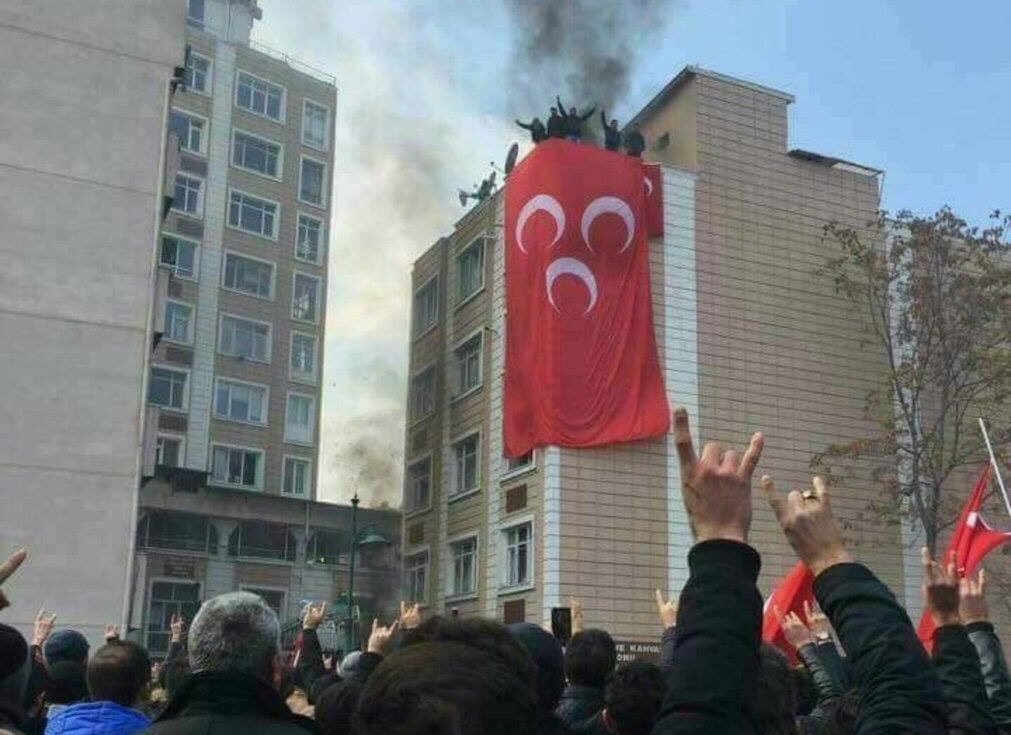 Members of the Grey Wolves occupy an HDP building in Kayseri, December 17, 2016. Photo: Twitter user @1parcatuhaflik
Members of the Grey Wolves occupy an HDP building in Kayseri, December 17, 2016. Photo: Twitter user @1parcatuhaflik
The most important of these groups are the Űlkü Ocaklari (Idealist Hearths), commonly known as the Grey Wolves and associated with the far-right Nationalist Action Party, or MHP. Despite recent divisions that have split the party, the Idealist Hearth movement has remained loyal to the leader of the MHP, Devlet Bahçeli, a close Erdoğan ally. In recent years other right-wing parties, including the AKP, have developed their own hearth organizations, most notably the AKP-affiliated Osmanlı Ocakları, or Ottoman Hearths. Since the coup attempt, the hearths have become more aggressive and, while there is no evidence that they are being directed by the government, it is clear that they are being allowed a freer hand to engage in direct action against perceived AKP enemies. Idealist and Ottoman Hearth groups have played a prominent role in physical attacks on the offices of the pro-Kurdish HDP, or People’s Democratic Party. The left-wing press is sprinkled with reports of hearth-initiated attacks—largely uninvestigated—against ordinary Kurds.[22] Both MHP- and AKP- affiliated hearths attacked rallies opposing the government-backed constitutional changes during the April 2017 constitutional referendum campaign. The hearths are not militias, and should not be equated with paramilitary forces elsewhere in the Middle East. But they do have the capacity to mobilize quickly and effectively with force against political enemies and increasingly have been allowed—or employed—to do so in Turkey’s ever more polarized environment.
THE CORE OF THE REVOLUTION’S DEFENSE: TURKEY’S LEVÉE EN MASSE
Perhaps the most powerful defense that Erdoğan holds in the face of another potential coup, as well as his strongest trump card against any pro-democracy opposition, is his capacity to directly mobilize the AKP base by rallying hundreds of thousands, even millions, of Turks to defend his, and, by extension the nation’s, cause. Threats to mobilize “the nation” have only grown in Erdoğan’s discourse since 2013, when he threatened to unleash “a million of my people” against the Gezi demonstrators.[23]
It was such mobilization that threw vital support behind loyal security forces and allowed Erdoğan to survive the attempted coup in July 2016. Turkish citizens across the political spectrum rejected the coup. But it was his own base that a shaken Erdoğan addressed via Facetime that night, expressing defiance and calling on his supporters to rally in the public squares and at the airports. “We will overcome this,” he told them, “go to the streets and give them their answer.”[24] It was his base that rushed into the streets by the tens of thousands to stop the tanks. As the Economist reported from Istanbul that night:
Supporters answered their leader’s call, streaming onto public squares in several cities and at Istanbul’s main airport. At mosques across the city, muezzins called for people to protest against the coup. In Istanbul, a group of Erdogan supporters made their way towards the city’s main shopping street, chanting “Allah is great.”[25]
It is the willingness of many in Erdogan’s base to fight and die, to face down bullets and lie down in front of tanks, that served as the guarantor of his rule in the face of its greatest threat to date. Security institutions were divided; had the populace stayed in their houses, the outcome would have been uncertain. But that night the streets and squares quickly filled with outraged citizens challenging the coup attempt. Even before Erdoğan was able to appear on television, coup plotters’ WhatsApp messages (later made public) suggested the challenges they faced in controlling the angry mobs.[26] After Erdoğan’s Facetime message was broadcast, the situation quickly turned in favor of the government, as the mosques called for popular mobilization. One plotter complained, “They [referring to the mosques] are whipping up fury among the public. Is there no way to stop it?”[27] Indeed, suppressing that level of mass support would have required a violence against crowds that is unprecedented in Turkish history, possibly triggering a civil war.[28] Apparently, that was a bridge too far for the putschists.
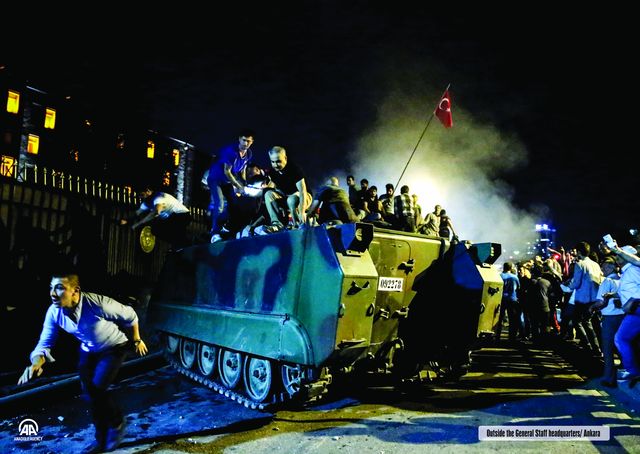 Protesters stand atop tanks outside the General Staff headquarters in Ankara during the July 2016 coup attempt. Photo: Ministry of Foreign Affairs
Protesters stand atop tanks outside the General Staff headquarters in Ankara during the July 2016 coup attempt. Photo: Ministry of Foreign Affairs
In another crisis, it is likely that Erdoğan would employ mass mobilization again to secure the state and his power. Since 2013, pro-government mobs repeatedly have targeted perceived enemies; since the coup attempt, mass rallies and a militant language of martyrdom and defiance has become a staple of Erdoğan’s rule. The government’s narrative and a compliant press describe a proud Turkey that must be defended against traitors, terrorists, and a duplicitous West. Erdoğan has weaponized long-standing elements of Turkish nationalism into a new culture of mass mobilization, one that represents a fundamental change in Turkish political culture. In the past, popular ceremonies and rallies only highlighted loyalty to the state; today, mass mobilization is seen as coequal, or even superior, to state power. It is a powerful weapon, but the risk of it being turned against peaceful opposition or simply spiraling out of control into broader violence is very real.
CONCLUSION:ERDOĞAN’S POPULIST AUTHORITARIANISM AND THE STORMS AHEAD
In today’s Turkey, democratic norms and the rule of law are falling by the wayside. Anxious to secure himself against another attempted coup or assassination, Erdoğan has politicized security institutions, given new prominence to paramilitary groups and hearths, and mobilized his own base to defend him. Erdoğan’s security is guaranteed today not only by formal security institutions such as the military and police, but also by an array of quasi-state and non-state actors whose fundamental loyalty is to him.
These actors, the most important of which is his own mobilized AKP base, saved the formal structures of Turkish democracy in July 2016, but they did not save its substance. More than a year after the coup attempt, a politicized security apparatus designed around fealty to Erdoğan works in tandem with a politicized judiciary and a controlled and cowed media to protect his rule, to frame any effective opposition or criticism as treason, and to bludgeon regime opponents. Erdoğan may even use such security tools to ensure his triumph in the 2019 presidential election. He would prefer to win the vote democratically, as this would grant him the greatest degree of legitimacy. But given the stakes, and his own rhetoric of martyrdom, loyalty, and a nation besieged, it is an open question as to whether he would be willing to lose if the electorate voted against him.
Erdoğan’s suppression of dissent has been accompanied by a rising record of abuse, torture, and enforced disappearances at the hands of the state or non-state actors. Security actors operate with impunity, resulting in a fundamental insecurity for anyone courageous enough to openly challenge Erdoğan. Turkey is a sharply divided country, but its public still believes that it should be ruled democratically. Today, however, the country retains the formal mechanisms of democracy, but none of its content. Erdoğan’s rule has become increasingly reliant on polarization and mass mobilization against internal enemies; the country lurches forward in a state of continual crisis. The collapse of Turkish democracy is unlikely to bring stability or security.
NOTES
1. “Cumhurbaşkanı Gençlerle Buluşuyor” [The President Meets with Young People”], TRT Haber, February 20, 2016, https://www.tccb.gov.tr/mulakatlar/1709/41239/trt-haber-cumhurbaskani-genclerle-bulusuyor.html
2. Ayla Jean Yackley, “Turkish President Casts Self as Heir to Reformer Who Died at the Gallows,” Reuters, August 28, 2014, https://www.reuters.com/article/us-turkey-erdogan-vision/turkish-president-casts-self-as-heir-to-reformer-who-died-on-gallows-idUSKBN0GS1ZP20140828; “Turkey President Turgut Ozal’s Remains Exhumed,” BBC, October 2, 2012, http://www.bbc.com/news/world-europe-19804813
3. Gülen was jailed by the Turkish military after the 1970 coup d’état and fled to the United States in 1999. See Joshua D. Hendrick, “Globalization, Islamic Activism, and Passive Revolution in Turkey: The Case of Fethullah Gülen,” Journal of Power 2, no. 3 (2009): 345–346.
4. Betul Ekşi, “Police and Masculinities in Transition in Turkey: From Macho to Reformed to Militarized Policing,” Men and Masculinities, article manuscript, under review.
5. Amnesty International, “Turkey: Draconian Reforms Give Police Wide-Ranging Powers to Repress Dissent,” March 25, 2015, https://www.amnesty.org/en/latest/news/2015/03/turkey-gives-police-broad-powers-to-repress-dissent/
6. Sarah El-Kazaz, “The AKP and the Gülen: The End of a Historic Alliance,” Middle East Briefs, Brandeis University Crown Center for Middle East Studies, July 2015, 4-5, https://www.brandeis.edu/crown/publications/meb/MEB94.pdf
7. Some revelations from these anti-corruption investigations are playing a role in the prosecution in the United States of Turkish officials and bankers, including the Turkish-Iranian gold trader Reza Zarrab, in an alleged gold-for-oil scheme to evade U.S. sanctions on Iran. The trial currently is underway in New York.
8. Daren Butler, “Turkey Officially Designates Gulen Religious Group as Terrorists,” Reuters, May 31, 2016, https://www.reuters.com/article/us-turkey-gulen/turkey-officially-designates-gulen-religious-group-as-terrorists-idUSKCN0YM167
9. Alan Makovsky, Erdoğan’s Proposal for an Empowered Presidency, Center for American Progress, March 22, 2017, https://www.americanprogress.org/issues/security/reports/2017/03/22/428908/erdogans-proposal-empowered-presidency/
10. İnsan Hakları Ortak Platformu, Olağanüstü Hal Tedbir ve Düzenlenmeleri, 31 Ağustos 2017: Güncelenmiş Durum Raporu [State of Emergency Precautions and Regulations: August 31 2017: Updated Situation Report], September 18, 2017, http://www.ihop.org.tr/wp-content/uploads/2017/09/Ola%C4%9Fan%C3%BCst%C3%BC-Hal-Tedbir-ve-D%C3%BCzenlemeleri-31-A%C4%9Fustos-2017.pdf
11. Metin Gürcan, “Never Again! But How? State and the Military after July 15,” Istanbul Policy Center, April 2017, 8, http://ipc.sabanciuniv.edu/wp-content/uploads/2017/04/Never-Again_Metin-Gurcan.pdf
12. Ryan Gingeras, “Deep State of Crisis: Re-Assessing Risks to the Turkish State,” Bipartisan Policy Center, March 2017, 16, https://www.academia.edu/33609229/Deep_State_of_Crisis_Re-Assessing_Risks_to_the_Turkish_State
13. Gőnül Től and Őmer Taşpinar, “Erdoğan’s Turn to the Kemalists,” Foreign Affairs, October 27, 2016, https://www.foreignaffairs.com/articles/turkey/2016-10-27/erdogans-turn-kemalists
14. Aaron Stein, personal communication with the author, December 2017.
15. See Boris Zilberman, “The S-400: Erdoğan’s Fail-Safe,” Foundation for the Defense of Democracies Policy Brief, November 3, 2017, http://www.defenddemocracy.org/media-hit/boris-zilberman-the-s-400-erdogans-fail-safe/
16. Website of SADAT, “Misyonumuz” [Our Mission], http://www.sadat.com.tr/tr/hakkimizda/misyonumuz.html, accessed December 15, 2017.
17. “Erdoğan’a Başdanışman atanan Adnan Tanrıverdi kimdir, Sadat nedir?” [Who is Adnan Tanrıverdi, Who Has Been Selected as Erdoğan’s Advisor? What Is SADAT?], CNN Türk, October, 17, 2016, https://www.cnnturk.com/turkiye/erdogana-basdanisman-atanan-adnan-tanriverdi-kimdir-sadat-nedir
18. Erk Acarer, “Ak Ordu ve Ak Emniyet şüpehsi” [Suspicion of a White Army and White Security], BirGün, August 18, 2016, https://www.birgun.net/haber-detay/ak-ordu-ve-ak-emniyet-suphesi-124586.html
19. Michael Rubin, “Has SADAT Become Erdogan’s Revolutionary Guard?” AEI Ideas: A Public Policy Blog from AEI, American Enterprise Institute, May 30, 2017, http://www.aei.org/publication/has-sadat-become-erdogans-revolutionary-guards/
20. United Nations Office of the High Commissioner for Human Rights, “Report on the Human Rights Situation in South-East Turkey, July 2015–December 2016,” February 2017, 14, http://www.ohchr.org/Documents/Countries/TR/OHCHR_South-East_TurkeyReport_10March2017.pdf; “In Custody: Police Torture and Abductions in Turkey,” Human Rights Watch, October 2017, https://www.hrw.org/sites/default/files/report_pdf/turkey1017_web_0.pdf
21. See, for example, Ryan Gingeras, Heroin, Organized Crime, and the Making of Modern Turkey (Oxford: Oxford University Press, 2014), 240–260.
22. Tamer Arda Erşin, “Kürt İsçilere saldıri raporu: Savcı ‘bulamıyoruz’ dedi,” [Report on Attack on Kurdish Workers: Prosecutor Says ‘We Can’t Find It’], Evrensel, July 1, 2017, https://www.evrensel.net/haber/325137/kurt-iscilere-saldiri-raporu-savci-bulamiyoruz-diyor
23. “The New Young Turks,” The Economist, June 8, 2013, https://www.economist.com/news/briefing/21579005-protests-against-recep-tayyip-erdogan-and-his-ham-fisted-response-have-shaken-his-rule-and
24. Merhul Srivastava, “How Erdogan Turned to Social Media to Help Foil the Coup in Turkey,” Financial Times, July 16, 2016, https://www.ft.com/content/3ab2a66c-4b59-11e6-88c5-db83e98a590a
25. “In Turkey, A Failed Coup against President Recep Tayyip Erdoğan,” Economist, July 15, 2016, https://www.economist.com/news/europe/21702319-regardless-outcome-turkish-politics-will-change-worse-soldiers-turkey-have
26. Christiaan Triebert, “‘We’ve Shot Four People. Everything’s Fine.’ The Turkish Coup through the Eyes of Its Plotters,” Bellingcat, July 24, 2016, https://www.bellingcat.com/news/mena/2016/07/24/the-turkey-coup-through-the-eyes-of-its-plotters/
28. Two-hundred and sixty-five people were killed in the 2016 coup attempt, 161 of whom were civilians or police, according to Turkish officials. The Turkish government–and public–has been willing to countenance very high levels of violence against civilians in suppressing Kurdish nationalist movements, but large-scale use of lethal force by the state in other contexts has been rare.
HOWARD EISSENSTAT is Nonresident Senior Fellow at the Project on Middle East Democracy and Associate Professor of Middle East history at St. Lawrence University. Eissenstat writes on twentieth-century Turkish history as well as on contemporary Turkish politics and foreign policy. He has lectured at the Foreign Service Institute of the U.S. Department of State and the Canadian Foreign Service Institute. Eissenstat received his PhD in Modern Middle East History from UCLA in 2007 and was a postdoctoral fellow at the Crown Center for Middle East Studies at Brandeis University in 2008-2009. His previous publications for POMED were Erdoğan as Autocrat: A Very Turkish Tragedy (April 2017), Stunted Democracy: Erdoğan, the AKP, and Turkey’s Slide into Authoritarianism (January 2015), and The Gezi Park Protests: Time for a New U.S. Approach to Turkey (June 2013).



